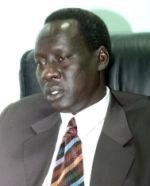Sudan’s FM says Darfur crucial to improve ties with US
January 22, 2008 (ISTANBUL, Turkey) — Sudan’s Foreign Minister has unveiled that Khartoum discusses with Washington ways to improve bilateral relations indicating that ending Darfur crisis in crucial to achieve this amelioration.

The Foreign Minister said that the United States informed Sudan that normalizations of relations between the two countries depends on the resolution of the five years conflict in Darfur.
According to Alor, Washington wants Sudan to begin direct talks with Darfur rebels in order to reach a political Solution to the conflict besides Khartoum cooperation with the international community in the deployment of 26000 hybrid peacekeepers in Darfur region, the official SUNA reported.
The foreign minister said there are established contacts with Washington to know its point of view as observer to push forward efforts for a peaceful solution to Darfur crisis.
He further indicated his ministry will undertake contacts with Washington following the meetings of the African Summit in Addis Ababa at the end of this month
Alor has unveiled that Turkey would play a key role to improve Sudan’s relations with the US particularly in light of its good ties with Khartoum and Washington. He added that he invited his Turkish counterpart to visit Khartoum in this regard.
In mid 2003, after a decade of severed ties because of Sudan’s links to terrorism, the US edged toward improved relations with the east African country, with the fight against terror and the need to play a greater role in Naivasha peace talks.
However with the emergence of the flagrant human rights violations and the crimes against humanity in Darfur, Washington set back the rapprochement process with Khartoum. The President Bush maintains economic sanctions imposed on Sudan since November 1997.
The United States has a wide range of economic sanctions in force against Sudan, from bans on trade and all oil and petrochemical transactions to prohibitions on selling defense-relate goods to Khartoum.
Last May 2007 the US president George Bush ordered stiffened sanctions on Sudan that will bar 31 companies controlled by the government from doing business in the U.S. financial system as well as sanctions on four Sudanese individuals, including two senior Sudanese officials and a rebel leader suspected of involvement in the Darfur violence.
Sudanese officials have acknowledges the negative impact of sanctions on their economy which prompted their central bank to convert their reserves from dollar to Euro.
Last December US president Bush signed into a law the “Sudan Accountability and Divestment Act of 2007″ passed by the Congress. The bill aims at providing protection from lawsuits to State and local divestment efforts in Sudan to sanction it over the Darfur crisis labeled genocide by the US administration.
The Sudan Accountability and Divestment Act of 2007 specifically targets the main sources of revenue of Khartoum; oil, power production, mining and military equipment. It will only impact foreign companies since most American businesses are prohibited from dealing with Sudan since 1997.
(ST)
